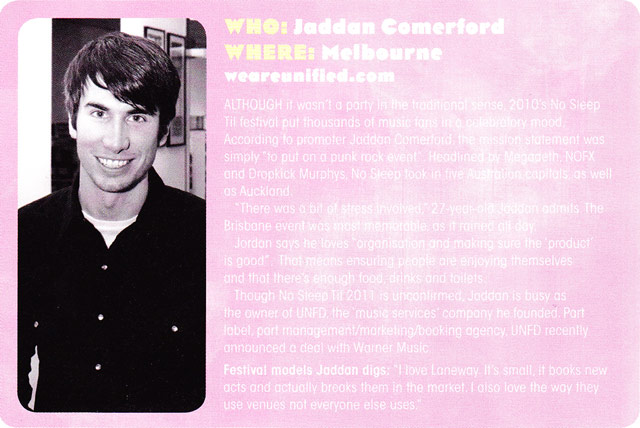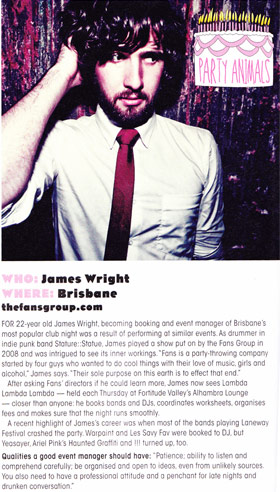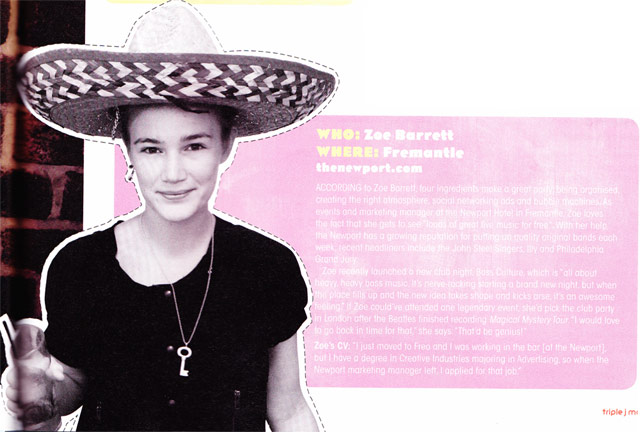Mess+Noise story: ‘The Lost Weekend: How A Festival Featuring The Drones, Dinosaur Jr Went Down’, March 2012
A story for Mess+Noise. Excerpt below.
The Lost Weekend: How A Festival Featuring The Drones, Dinosaur Jr Went Down
Almost two years to the day since he pulled the pin on his fledgling festival, the founder of Brisbane’s Lost Weekend speaks for the first time about what went wrong and why punter apathy is the biggest threat to would-be promoters. Interview by ANDREW MCMILLEN.
Billed as a three-day camping event located at a conference centre 45 minutes south-west of Brisbane, a 2010 music festival named The Lost Weekend seemed a worthy contender for the interests of Queensland rock fans who couldn’t afford to head south for Golden Plains. Headlined by Dinosaur Jr, The Dirty Projectors, Wooden Shjips and Nashville Pussy – among Australian bands like The Drones, Tumbleweed, Little Birdy and Whitley – the festival shared several of Golden Plains’ bigger names. Unpowered camping ticket prices ranged from $166 to $207, for a two- or three-day pass, respectively. Hardly a princely sum, considering the ever-increasing costs of competing events on the annual calendar.
Alarm bells began ringing three months after the initial announcement. A month out from its debut, The Lost Weekend was downsized to two dates and relocated to the Brisbane Riverstage due to apparent licensing disputes. The two-day ticket cost dropped to $150. A M+N news story reported that organisers were determined to make the event in March the “perfect end to the festival season”, and not another Blueprint”. And then, just days out, organisers pulled the plug citing “insufficient time to achieve critical mass”. Unlike the aborted BAM! Festival, an overly ambitious camping event that was set to be hosted at the same venue, The Lost Weekend at least had the foundation of an appealing event by booking a strong, rock-centric line-up.
It also had festival promotion brains and experience behind the operation. Founder Michael Kerr, 38, had hosted the Sounds Of Spring festival at Brisbane’s RNA Showgrounds in 2008 and 2009, and appeared to be slowly growing the event: the second year saw 14,000 fans take in artists like The Living End, Tex Perkins, My Disco and Giants of Science (the latter two in the midst of a rare dust storm). Yet as The Lost Weekend disintegrated, Kerr went to ground, and hasn’t publicly commented since the public failure of his latest festival attempt. Sounds Of Spring has yet to return, either.
I meet Kerr for the first time in March, two years and two days after the event would’ve debuted – if only he’d sold a few more tickets. He sips a hot chocolate while we sit at a cafe outside the Queensland Performing Arts Centre. During a wide-ranging conversation, I find Kerr to be quite upfront about his mistakes, slightly disdainful toward the unfortunate habit of Brisbane concert-goers to postpone buying tickets until the last minute, yet optimistic about the possibility to organise future events here in Queensland. He also laughs a lot, even though the topic we met to discuss isn’t particularly funny – or so I thought.
What was your original desire with The Lost Weekend?
There was nothing going on. Generally, you try to do events because nothing comes to Brisbane, and we miss out. So we got onto the guys at Golden Plains, and agreed to share some bands but not all, and grew from there. [Laughs] Just to make a good weekend. It was never going to be that large. Never wanted it to be that large. [I wanted it to be] something I want to go to.So the Golden Plains connection was pretty integral to making it all work?
Yes, and no. We probably picked that weekend so we could [make it work], but if nothing happened there wasn’t a big issue. There were enough bands around otherwise to make it work. We did pick up seven or eight of their bands, but not all of them. And that was a deliberate thing we spoke about, because we didn’t want to just do what they were doing, and they didn’t want us to do what they were doing as well.Why Ivory’s Rock [Convention Centre]? Had you looked at a few other locations before that?
We looked at a number of places; particularly it was a really good site. It had all the facilities, had an undercover amphitheatre, had everything; places for food stores, toilets, loos, showers. [It had] everything, everywhere to deal with; where everything else was getting port-a-loos and sleep in the bush. It had proper, flat, perfect camping areas. And no neighbours to disturb.How did you come across it in the first place? I had never heard of it until The Lost Weekend was announced.
Neither had I, actually. Ipswich City Council, who actually were really supportive of doing something, and I originally spoke to them because I was interested in using the Archerfield Speedway area, and they said, “Oh, you should check this place out.” So I checked it out and it worked. [Laughs] Nothing will ever happen there now, though; they don’t want to do anything. They had a change in management and the new managers – it’s run by this religious organisation. The guru from India comes out and speaks there every couple of years and they have like 6000 grannies there. Well, not just grannies but all these people come and hang out there, and pay 500 bucks to hear him talk for five days.That sounds interesting…
The manager at the time wanted other things to go on there, and he pushed really hard to get events in. He’s gone, and the new management don’t want to do a thing.So they don’t like the idea of a rock music festival?
They don’t like the idea of anything else. It’s their little land just for them.As you know, after you, BAM! Festival tried to go there. It’s interesting to know nothing at all is going to happen there now.
Nothing’s going to happen out there.
To read the full story, visit Mess+Noise.
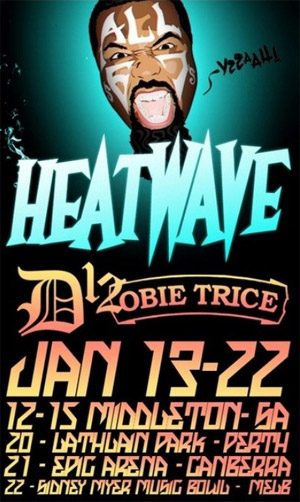 A festival
A festival 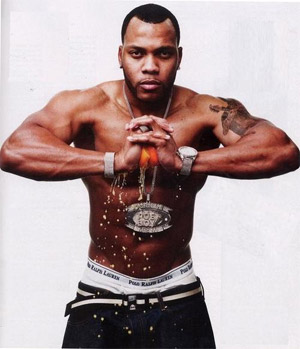 An eleventh hour cancellation is every live music promoter’s worst nightmare. Last week, we
An eleventh hour cancellation is every live music promoter’s worst nightmare. Last week, we 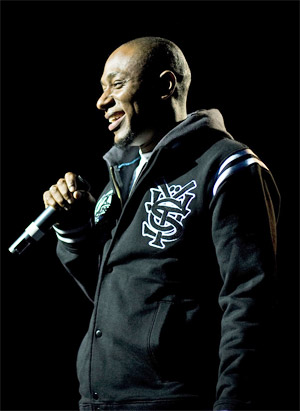 One year ago, acclaimed American hip-hop artist Dante Smith – stage name Mos Def (pictured right) – was set to tour Australia for the first time. Eleven shows were booked, including headline festival appearances at Soundscape in Hobart and The Hot Barbeque in Melbourne. After failing to appear at his first scheduled performance in Adelaide, he went on to randomly skip four shows of the itinerary. Such was the ensuing confusion, that following the postponements, cancellations and sternly-worded press releases from the promoter, Peace Music, became something of a sport here at TheVine. For background, revisit our news story
One year ago, acclaimed American hip-hop artist Dante Smith – stage name Mos Def (pictured right) – was set to tour Australia for the first time. Eleven shows were booked, including headline festival appearances at Soundscape in Hobart and The Hot Barbeque in Melbourne. After failing to appear at his first scheduled performance in Adelaide, he went on to randomly skip four shows of the itinerary. Such was the ensuing confusion, that following the postponements, cancellations and sternly-worded press releases from the promoter, Peace Music, became something of a sport here at TheVine. For background, revisit our news story 